

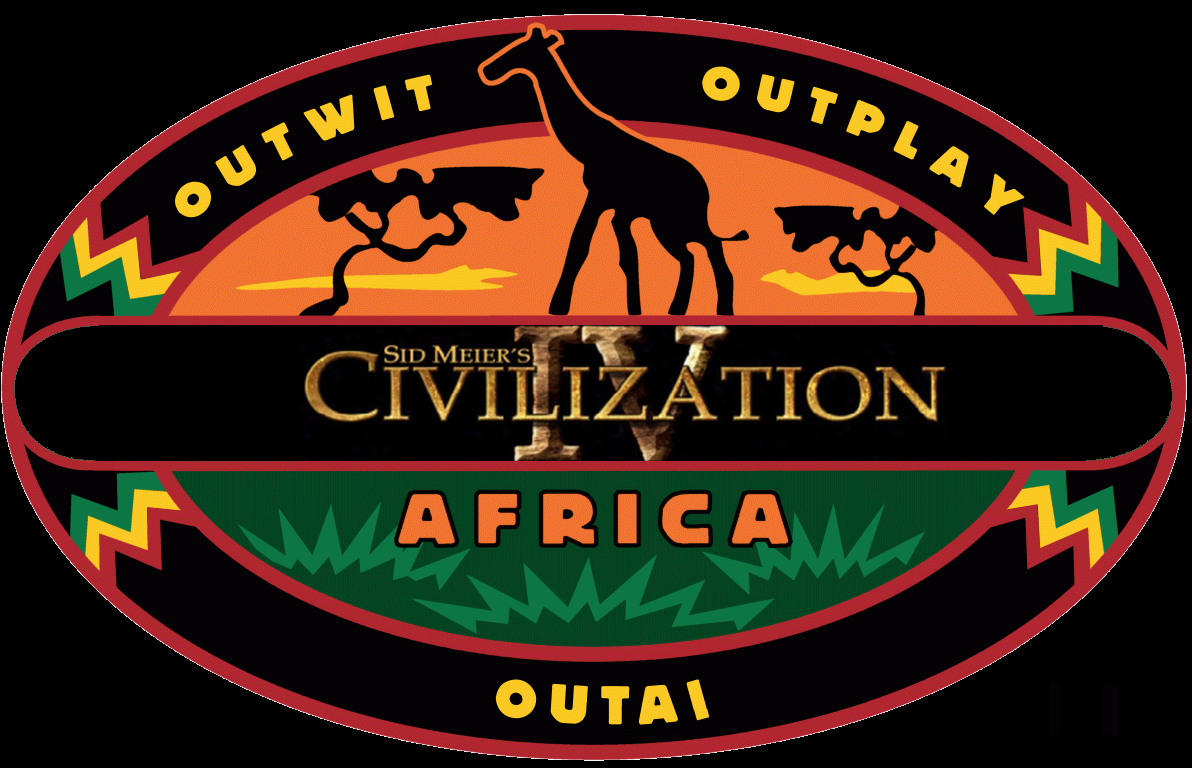
For our second game of AI Survivor, we had another big collection of predictions from the community to sort through, even more than the number for the first game. This time we finished with 123 predictions which may be the most we've ever had. There was no clear favorite for the winner, with pregame opinion leaning slightly towards Asoka and Joao, but not in any great numbers. The only place where there was any kind of consensus was in the "First to Die" category, where Isabella's religious zealotry made her the clear favorite. I found this game to be extremely hard to predict, with so many AI leaders sporting similar peace weights. Everyone would be predisposed to like everyone else, making it hard to figure out how the diplomacy would shake out. It was clear that this was a game where religion would play a major role, since several of these AI personalities (Isabella, Asoka, Gandhi) place a heavy emphasis on faith. Control of that broad band of jungle in the middle of the map would also be critical. The AI leaders who prioritized that region would be likely to do well, while those that ignored it did so at their peril.

Three different AI leaders pushed for a religion immediately out of the gate. Isabella, Asoka, and Gandhi were all competing to see who would land the Polytheism religion, with none of them picking Meditation as their first research. Pregame opinion thought that Asoka or Gandhi would snag that religion because of turn order, and we were caught off guard when Isabella managed to get a turn ahead of the two Indian leaders and reach the target first. She went ahead and founded Christianity, her preferred choice with the "Choose Religions" option enabled. Now Asoka belatedly turned to pursue the Meditation religion, only to find that another leader had the inside edge. In completely random fashion, Churchill had opened the game by researching Mysticism followed by Meditation, and he wound up establishing the second religion on Turn 15:
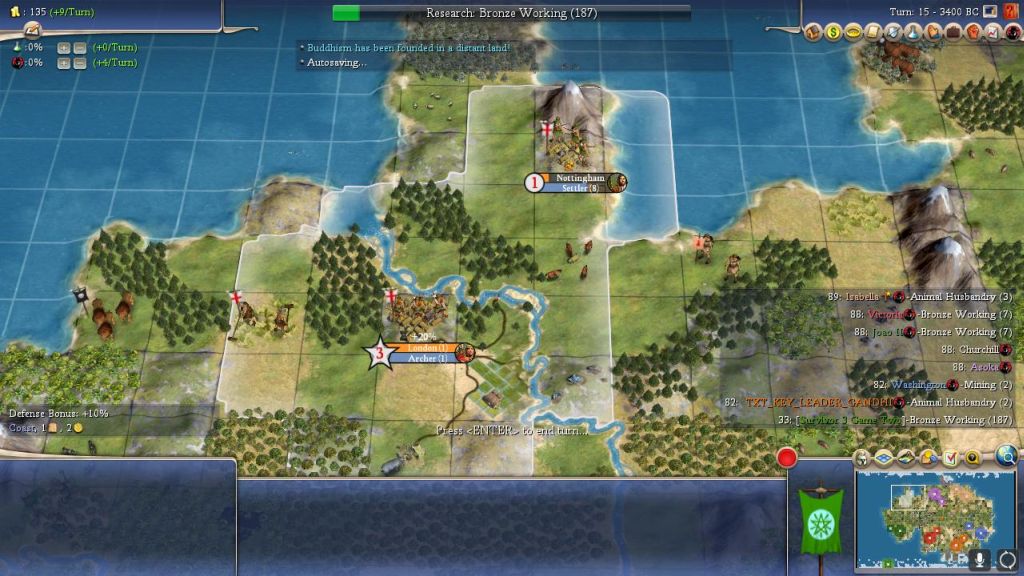
Seriously, CHURCHILL founded the second religion of the game?! What in the world was going on here?  That threw a monkey wrench into the expected religious trajectory of this game, with the western corner of the continent getting its own early religion to play around with. To make things even crazier, I knew that Asoka and Gandhi wouldn't just stop pursuing their own religions. They would continue to push for their own self-founded faiths to spread around, which would potentially leave us with four major competing religions. Indeed, Asoka followed up his failed attempt at Meditation by research Masonry and then Monotheism, founding Judaism on Turn 29. Now all three of the northern civs had their own religions, one apiece in the east, middle, and west. These three religions would go a long way to shape the subsequent diplomacy in this game.
That threw a monkey wrench into the expected religious trajectory of this game, with the western corner of the continent getting its own early religion to play around with. To make things even crazier, I knew that Asoka and Gandhi wouldn't just stop pursuing their own religions. They would continue to push for their own self-founded faiths to spread around, which would potentially leave us with four major competing religions. Indeed, Asoka followed up his failed attempt at Meditation by research Masonry and then Monotheism, founding Judaism on Turn 29. Now all three of the northern civs had their own religions, one apiece in the east, middle, and west. These three religions would go a long way to shape the subsequent diplomacy in this game.
In terms of expansion, most of the leaders settled cities in reasonably logical fashion. Churchill was an exception, immediately sending his second settler north as pictured above, where Nottingham became the Buddhism Holy City. If he had gone south instead, Churchill could have claimed a huge amount of territory for himself. This was a mistake that would end up costing him later. Victoria acted in similar fashion, sending her first settler north but then her second settler down into the southern tundra in a move that made no sense at all. Joao, who was in the southwest corner of the map, sent his first two settlers further south and west to claim some beachfront property. Not the smartest way to open the game. The one AI who had an intelligent settling pattern was Gandhi. He had looked to be squeezed on land in the pregame screenshots, but addressed this issue by immediately sending his initial settler northeast to claim disputed territory away from Washington, and then the second settler northwest to lock down the border with Victoria. With a substantial patch of tundra in the deep south to be settled later, Gandhi was now in a position to have as much land as anyone else. With two friendly neighbors on either side, this was an ideal opening for the overly pacifistic Indian leader.
By Turn 50, much of the map had already been claimed:

Victoria, Isabella, Gandhi, Churchill, and Asoka were all extremely close in score at this point. Victoria's score was somewhat deceptive, inflated by her possession of the Great Wall, and I didn't like the looks of her position going forward. She was already running out of land and Gandhi had managed to claim the bulk of the territory between them. In contrast, Isabella looked to be doing great, with her own self-founded religion, five cities pushing into the center of the map, and ample land still to grab on the eastern edge of the continent. Washington had been expanding poorly thus far, and the Americans were already falling behind the rest of the pack. For his part, Gandhi not only had five cities in his core, he also managed to capture the barbarian city of Bantu with a wandering archer, providing a sixth colony of sorts in the middle of the map. (It would later end up being surrounded by English territory, leading to the amusing spectacle of an Indian colony in the middle of England.) Asoka was still obsessing over religion at the top of the map, although he did have the good fortune to capture the city of Gaul from the barbarians a little bit later, and that helped a lot on India's southern border. Finally, over in the west Churchill was trolling Joao with the placement of Warwick, cutting off Portugal from further eastern expansion. Churchill's territory was spread out in a weird line that didn't look very defensible. Joao had been a bit foolish in his initial city placements, but now he was regrouping and pushing out the settlers in rapid fashion. Portugal would later capture Tartar and seal off the western edge of the Pangaea with a solid core of seven or eight cities.
We had an early war declaration in this game, and to no one's surprise, it was based around religion:
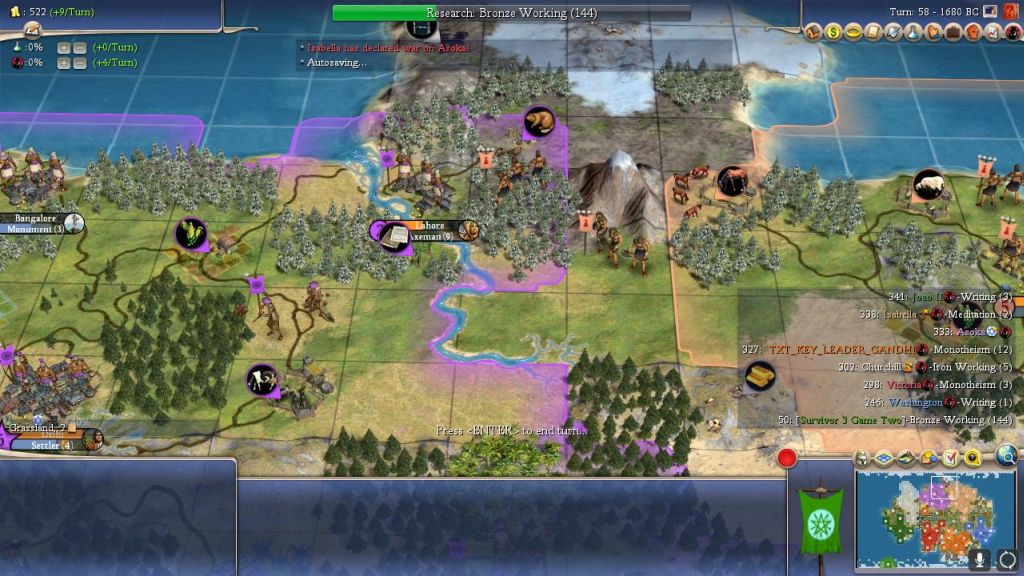
Isabella pulled the trigger against Asoka and went after the border city of Lahore. This was a smart move from the Spanish leader's part, as she had copper on hand for axes and spears while Asoka still lacked metals. Isabella managed to catch Asoka with his pants down and took Lahore without much trouble. Afterwards, the war stalled out as the axes that Spain was fielding were unable to punch through the heavy cultural defenses that Asoka had protecting his other cities. They continued to fight for several dozen more turns without any more cities changing hands, and eventually signed peace with one another around Turn 100. The net was Isabella picking up one city, but this war had probably been a mistake in the larger picture. Isabella's focus on the Indian war slowed her expansion to the east, and she would wind up losing some territory to Washington and Gandhi that could have been hers with a more determined expansion push. It's not unusual for early wars to backfire in this way, and the AI leaders that try to fight too early can often wind up sabotaging themselves. For the moment though, Isabella was still in excellent shape.
The next war declaration came on Turn 86, as Joao decided to vent his frustations against Victoria. Portugal had to be under significant pressure to expand, and Joao was blocked from attacking Churchill by virtue of their shared Buddhist faith. The most likely outcome here was Portugal losing the city of Gepid, a little colony isolated from the rest of Joao's territory that had been taken from the barbarians earlier. Instead of that happening though, Joao brought in a friend to help him out:
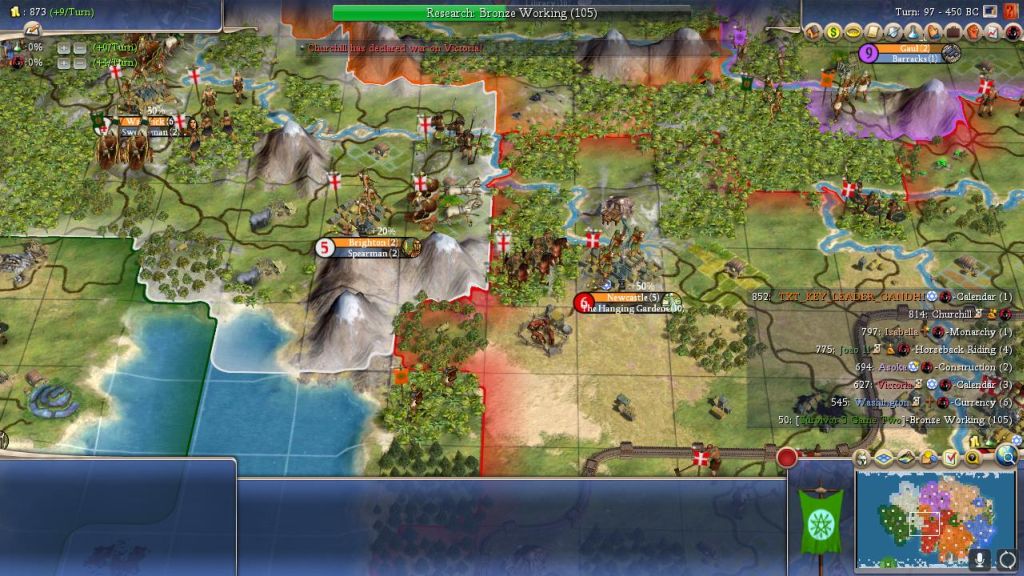
With the Buddhist team working together, Victoria was now in serious trouble. Her English Danish forces had been depleted by war with Portugal, and the entry of the English into the war was hitting at just the right time for Churchill. The border city of Newcastle was taken, and far from Gepid falling, Victoria lost a second city in the northeastern corner of her borders to Joao. Now the cities of Gepid and Newcastle formed a small green blot in the center of the map, a unified Portuguese colony in the dead center of the continent. If the war continued, it looked like Victoria might soon be eliminated from the game entirely as the first to die. Instead, she was able to sign peace with first Joao and then Churchill, stabilizing on four cities. Her position was very weak though, and any chance of Victoria winning the game was effectively over. The best she could hope for was surviving to live and fight another day in the Wildcard match.
Meanwhile, there were two other major developments taking place. In the north, Asoka declared war on Isabella and eventually managed to recapture the city of Lahore that had been taken in their previous struggle. Those two hated one another with a passion, their respective religions fueling a mutual paranoia that could not be sated. They would continue to war for some time, but without any more cities changing hands. With two empires evenly matched in size and technology, there was no way for either to break through and inflict a decisive defeat on the other. Eventually they signed peace and went back to infrastructure mode, each of them cranking out missionaries as fast as they could be built. Elsewhere, Gandhi also finished researching Code of Laws and established Hinduism within his territory. For the moment Gandhi was content to stick with the Judaism that predominated in the center of the map, but all Civ4 AIs have a strong preference to convert to their own self-founded religion. Once Gandhi converted enough of his own cities to Hinduism he would likely switch over, and that had the potential to shake up the diplomacy in this game.
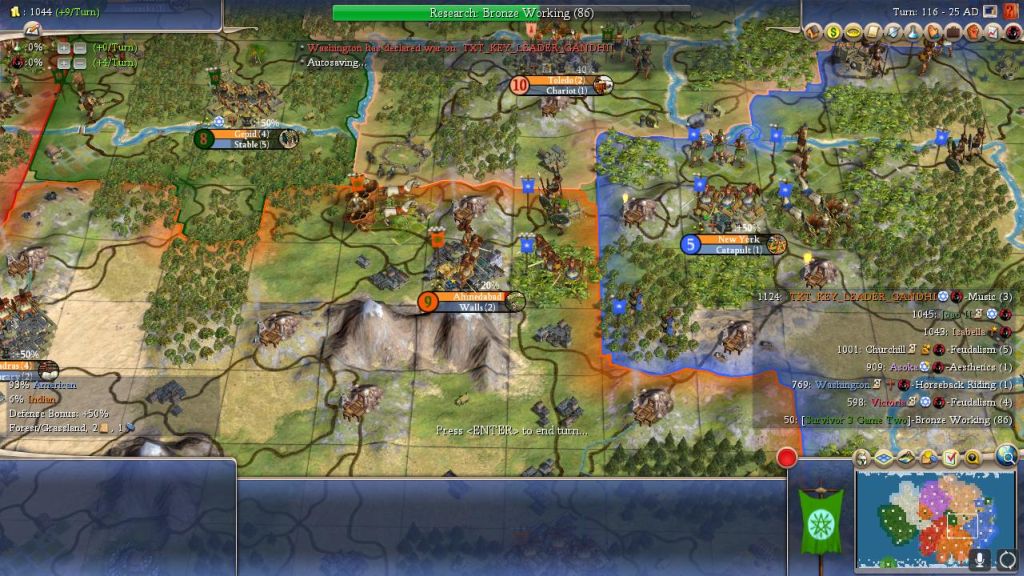
Washington also foolishly declared war on Gandhi on Turn 116, which resulted in a short war where Gandhi thoroughly dominated the smaller American empire. They eventually signed peace with Washington ceding the border city of New York in the treaty. This firmly established Washington as one of the runts of the game, with the Americans going into isolationist mode afterwards and hoping no one would attack them further. On the other hand, Gandhi had now become even stronger in the wake of this victory. Southern India was beginning to open up a score lead and tech lead over the rest of the field, with Gandhi's hyper-passive personality serving him well in terms of economic development. Some of our stream viewers pointed out that Gandhi often does better when another AI leader attacks him, as that will get Gandhi to build enough units for safety, and that may have been the case here. He was starting to emerge as the favorite, with slighty more territory than anyone else.
After that series of wars came to a close, this game entered into a long stretch of worldwide peace. For many dozens of turns, there was no fighting at all despite some angry faces on the diplomatic screen. One thing that the religious leaders were doing was cranking out lots of missionaries:
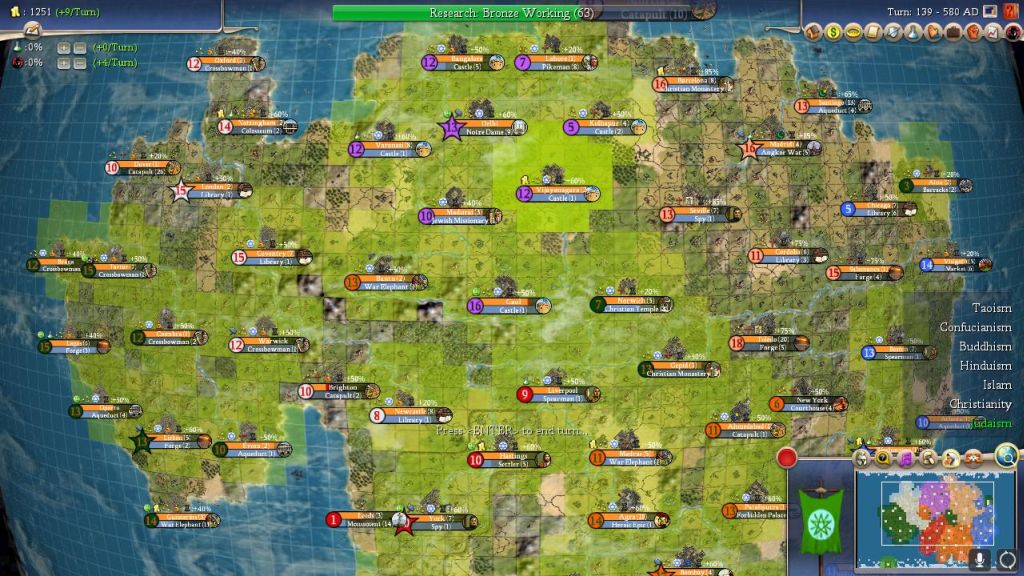
That's an overview map with the religious lens turned on and attuned to Judaism. Asoka had been going nuts with the spreading of his faith, and his shrine had to have been worth a mint. The only parts of the world lacking Judaism were Isabella's territory (who would not give Asoka Open Borders) and Churchill's lands, where I believe the English leader was in Theocracy at the moment. Isabella's Christian religion was almost as widely spread, blanketing the eastern half of the continent and beginning to make serious inroads in the west. Buddhism lacked the popularity of those two, since Churchill doesn't obssess over missionaries to the same degree, but it had also been widely spread in the west. Now all we needed was for Gandhi to start spreading his own Hinduism to have a fourth major religion in the mix. This was a major game for spreading each faith.
We advanced through these peaceful turns fairly quickly. There was such a long spell of peace that some of the viewers were wondering if we might get to the end of the game without any of the leaders being eliminated, which has never happened before in almost 30 total games of AI Survivor. Eventually the war horns blared once again and we had a new conflict to watch:
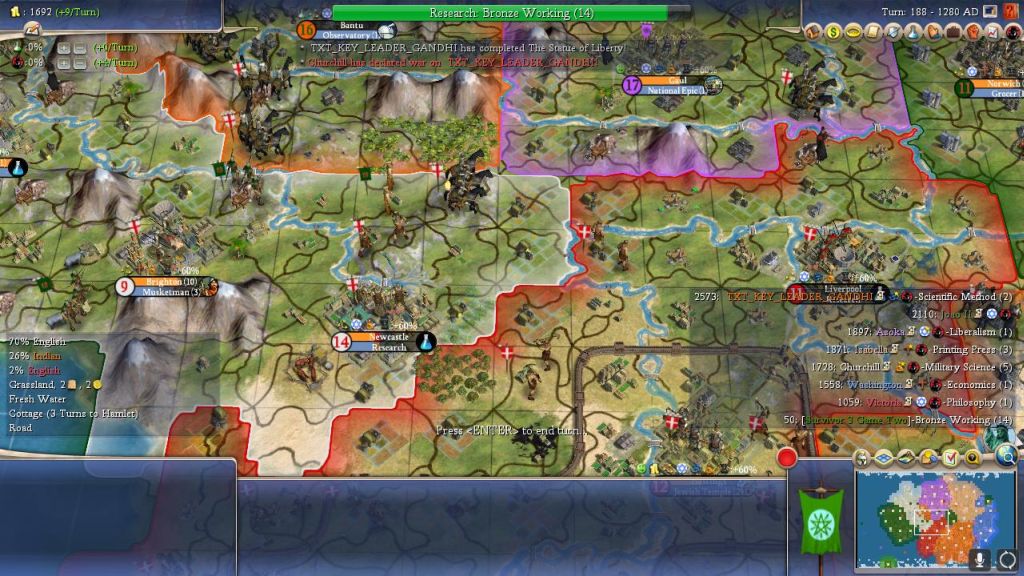
Churchill decided that he would take a swing at Gandhi on Turn 188. While that might seem random, there was a legitimate motivation for this war. Gandhi was still holding onto the city of Bantu, visible in the orange borders at the top of this screenshot. Gandhi's strong culture was pressuring the nearby English cities, and Churchill had a small window here with an actual military edge over Gandhi. The Indian leader was doing his typical thing where he avoided researching anything that might have a military component, and so even though Gandhi had Democracy and Scientific Method techs, he still lacked Gunpowder while Churchill had researched just enough techs to reach cuirassiers on a determined beeline. A quick victory over Bantu followed by a peace treaty would have been an optimal outcome for Churchill.
Instead, Churchill blundered the situation badly. Somehow he failed to take Bantu despite an overwhelming edge in both units and technology at the outset of the war. The English units were running around in circles doing something strange with their pathfinding rather than simply throwing everything at Bantu and running over the defenders. As more turns continued to pass without success, the clock continued ticking. Gandhi finally researched Rifling tech and soon there were rifles and cavs on the scene, units that Churchill struggled to match. While the English eventually did capture Bantu on Turn 208, it was already too late. Gandhi took it back a few turns later, and there was no chance that it would fall again. From this point forward, Churchill would be the one on the defensive.
That situation lasted for a long time, with Churchill defending and Gandhi unable to make any further progress. English redcoats definitely helped here, as they were able to hold their own even after Gandhi reached Assembly Line and began adding infantry to the mix. Gandhi also made some foolish decisions about where to attack, for some reason going after Nottingham deep in Churchill's back lines rather than attack somewhere logical like Newcastle. The stream viewers eventually figured out what was going on here: Gandhi was targeting Nottingham because it was the Buddhist Holy City, even though it made no tactical sense as a war objective. Typical AI.  Gandhi did manage to pull Victoria into this war twice, only to see her sign peace almost immediately aferwards in both cases. That did little other than tick up the war counter for prediction contest scoring purposes. In the north, Asoka and Isabella also fought another inconclusive war with one tundra city changing hands, their third war of the game. They eventually signed peace with nothing further happening. We appeared to be stalemated on all sides for a long period.
Gandhi did manage to pull Victoria into this war twice, only to see her sign peace almost immediately aferwards in both cases. That did little other than tick up the war counter for prediction contest scoring purposes. In the north, Asoka and Isabella also fought another inconclusive war with one tundra city changing hands, their third war of the game. They eventually signed peace with nothing further happening. We appeared to be stalemated on all sides for a long period.
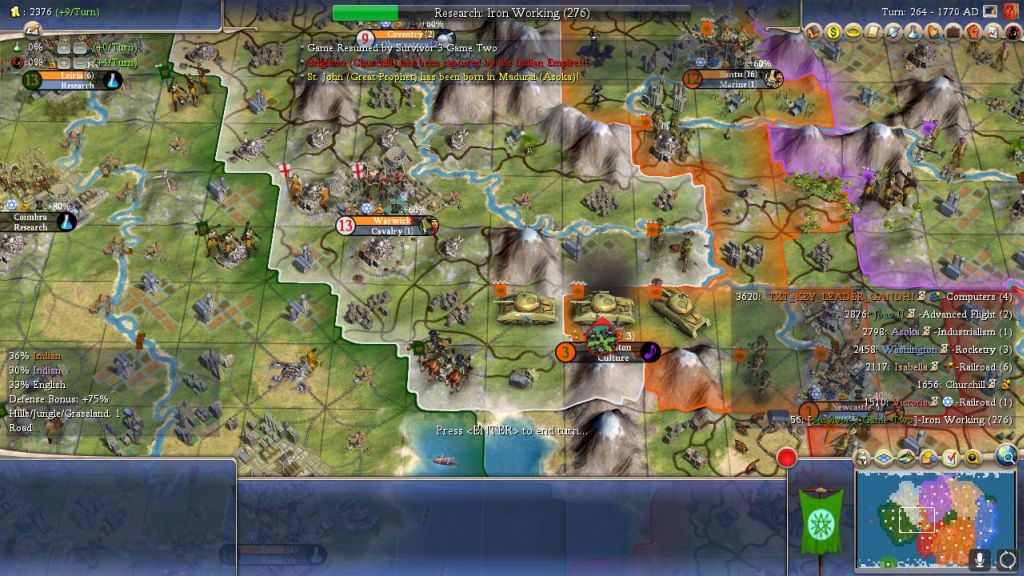
When the stalemate finally broke open though, it broke in a big way. The key factor was technological advance; Gandhi had been leading the rest of the field in research for some time now, and Churchill could not keep up. While he was able to hold off attacks from infantry with his redcoats, Churchill stood absolutely no chance once Gandhi appeared with Indian tanks. It was remarkable to see how fast England began collapsing once those orange tanks appeared on the scene. The borders had been locked in place for centuries, and all of a sudden the tanks just crushed everything in their path. One city after another fell to the new lightning offensive, with London itself falling on Turn 273. Making things even worse for Churchill, Gandhi had built the Statue of Zeus early in the game, and the loss of happiness resources along with war weariness was killing the few cities that the English had left. It was all over for Churchill on Turn 286:

Gandhi had reached Robotics and had mechanized infantry running around by the time that this war was over. Yeah, that was not a conflict that was going to end well for Churchill. What a terrible mistake he had made. Gandhi might not start wars, but he certainly finishes them. 
On the same turn that Churchill was eliminated, there was a Diplomatic victory vote that Joao nearly won. He had come up less than 40 votes short, and either one of Isabella or Victoria would have been enough to put the Portuguese leader over the top. If a couple of the recent Indian conquests were to culturally flip over to his control, that might be also enough to declare Joao the victor. For that matter, Isabella had declared war on Asoka a little bit earlier on Turn 282, and that conflict was also backfiring in the worst manner. Asoka had finished researching Industrialism tech and brought tanks onto the field which the Spanish were not able to counter. Isabella still lacked Assembly Line, and we had just seen how badly rifle defenders do against tanks. If Asoka could absorb some Spanish population, that also might be enough to unlock a diplomatic win for Joao.

Asoka and Isabella had detested each other for the entire game. This was their final climactic showdown, and there could be only one survivor of this religious duel. Unfortunately for Isabella, she had fallen too far behind in technology, and that was evident from the first turn of the war. The Spanish had moved a big stack of several dozen cavs and rifles up to Kohlapur, the closest city on the border, and prepared to put it under siege. Then Asoka hit the stack with eight artillery units followed by a whole bunch of tanks and infantry. The Spanish invaders died to a man, every single one of them wiped out in a single turn. It's rare to see a defeat that decisive in a war between AI civs, and without factories Isabella had no prayer of replenishing those units. Indian tanks once again rolled across the plains of a backwards rival, and the Spanish cities were taken one after another. The entire war was finished in less than 20 turns:

Note the fallout surrounding the city of Salamanca. Gandhi had built the Manhattan Project, and Asoka was perfectly happy to use that as permission load up on tactical nukes. He nuked the tiny remnants of the Spanish forces before occupying the last city. That was way more overkill than was necessary, but as I said, those two really hated one another in this game.
We were now in the endgame well and true, with a race for which leader would win and by which victory condition. After conquering Churchill, we checked Gandhi's tech progress and found that he wasn't as far ahead as we expected. Gandhi still needed nine more techs to launch the spaceship, and Joao wasn't far behind. Once Asoka finished his own conquest of Isabella, he wasn't too far back either, although Joao was the only leader who had a realistic chance of catching Gandhi. There was also the issue of whether a victory would be won via Spaceship, Culture, or Diplomacy. We found that once Asoka was done absorbing all the Spanish cities, he became nominated against Gandhi in the United Nations, and they ended up splitting the vote. That ended up ruling out the diplomatic condition, curtailing the focus down to just space and culture. Gandhi had three different cities over 30k culture, and if he ran the culture slider at all, he would win that way before finishing the spaceship. Asoka also excited us by turning on the culture slider himself - could he beat Gandhi? Well, not so much as it turned out. Asoka's third city only had about 19k culture, and even with the slider turned on and the city making 660 culture/turn, it would take almost 50 more turns for him to win. It looked like this was going to come down to space after all.
The space race heated up in earnest when Joao lost his marbles and declared war on Gandhi on Turn 306. Gandhi wasted no time by responding with overwhelming force:
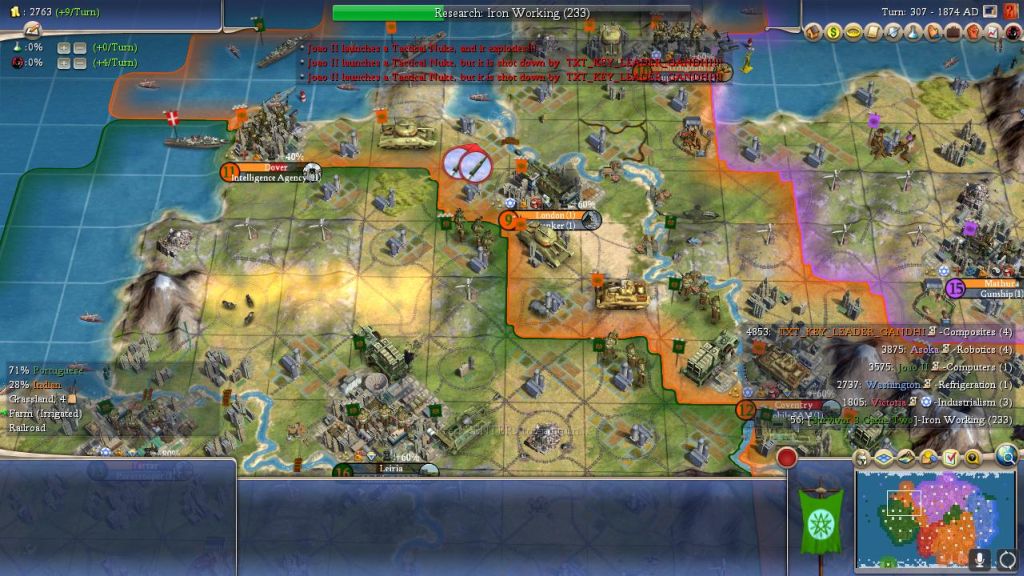
Ever since the original Civilization game where a bug in the coding caused Gandhi to be super-aggressive with nuclear weapons, he's been the leader most likely to use nukes against other leaders. That remains true in Civ4 as well, and in this game Gandhi had built up a sizable nuclear arsenal. The only thing that saved Joao was possession of his own SDI national wonder, which shot down most of the incoming blasts. That did nothing to shield Joao from Gandhi's conventional forces, however, and the Portuguese colony in the middle of the continent was quickly crushed. Gandhi was about to start capturing core cities when a "stop the war" peace treaty was voted on and accepted in the United Nations, saving Joao's bacon. That looked to be the end of the exciting portion of this game, only for Gandhi to renew the war again on Turn 327. Yes, Gandhi actually started a war himself! This ultimate rarity in Civ4 showed how much the Indian leader had been angered by Portugal. A new barrage of nuclear missiles rained down on Joao's cities, with the Portuguese SDI shooting down seven of them in a row (!) at one point. It was a good thing that Joao had a comparable tech level to Gandhi. Still, Gandhi's military force was off the top of the power charts, and his modern armor were starting to punch through Joao's core cities. Portugal was being crushed by war weariness, and it was only a matter of time before Joao was the next to be eliminated.
He was saved by the progress of Gandhi's spaceship. Gandhi had launched on Turn 321, and the spaceship reached Alpha Centauri on Turn 331 to put a stop to the game:

What a great ending to this one! Not only did we get the nuclear showdown, there had been real tension about whether the game would end by spaceship or culture up until the final turns. Gandhi had two Legendary cities, and his third was sitting at 44k culture when the victory message appeared. Joao had also completed the entire tech tree and was about to launch his own spaceship when the game ended. Asoka was similarly only a few techs back. Somehow Victoria managed to survive until the end of the game without anyone trying to eliminate her. Churchill and Joao should have gone after her, not Gandhi. Then there was Washington, who basically did nothing the entire game except launch one failed war against Gandhi. He didn't deserve to move on to the Wildcard game, but will make an appearance there anywhere. What a boring AI leader. 
Congratulations go to shallow_thought for winning our picking contest in Game Two with 19 points. He correctly predicted Asoka as runner-up, Churchill as first to die, and the Spaceship victory condition, while landing close guesses on the number of wars and victory date. We had several other excellent entries that came up with almost as many points. I was slightly frustrated with my own prediction, which had almost gotten this game correct. I almost scored points for picking Isabella first to die, and almost scored points for having Asoka first instead of second, and almost had the cultural victory correct. Unfortunately, those were all wrong though, and I ended up with a miserable 4 points. Better luck next time.
I had been worried that this game would be a boring peaceful lovefest on all sides. Instead, we had a fun and memorable game. Let's hope the rest of the matches go as well.



